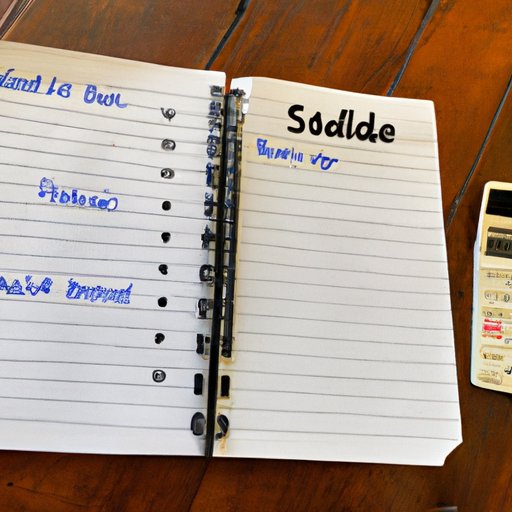Introduction
A ledger is an accounting tool used to record financial transactions. It is an organized way to track income and expenses, helping to ensure that all financial information is accurately recorded and accounted for. Using a ledger for personal finance can provide many benefits, such as increased financial control and organization, improved budgeting capabilities, and easier tracking of expenses and income.

Benefits of Using a Ledger for Personal Finance
Using a ledger for personal finance can help you gain greater control over your finances and improve your overall financial health. Here are some of the key benefits of using a ledger for personal finance:
Increased Financial Control and Organization
Using a ledger allows you to keep track of all of your financial transactions in one place. This helps you to maintain accurate records of all your income and expenses, giving you better visibility into your financial situation. Having this information at your fingertips makes it easier to make informed decisions about your money, allowing you to take control of your finances.
Improved Budgeting Capabilities
A ledger can also help you create and stick to a budget. By tracking your income and expenses in a ledger, you can easily identify areas where you are spending too much or not enough. This allows you to adjust your budget accordingly, helping you to reach your financial goals.
Easier Tracking of Expenses and Income
Using a ledger makes it easier to track your income and expenses. By recording each transaction in the ledger, you can quickly and easily view your financial activity over a given period of time. This makes it easier to spot any discrepancies or mistakes, and take corrective action if necessary.

Steps for Setting Up a Ledger System
Setting up a ledger system is relatively easy and can be done in a few simple steps. Here’s what you need to do to get started:
Decide How You Want to Track Your Finances
The first step is to decide how you want to track your finances. Do you prefer to keep track of your finances manually, or would you prefer to use a computerized system? Depending on your preferences, you may want to consider using a spreadsheet program, a software program, or a physical ledger book.
Choose a Ledger System That Fits Your Needs
Once you have decided how you want to track your finances, you need to choose a ledger system that fits your needs. Consider factors such as cost, ease of use, and features when selecting a system. There are a variety of options available, so take the time to research and compare different systems before making a decision.
Set Up Your Ledger System
Once you have chosen a ledger system, it’s time to set it up. This involves creating accounts and categories to track your income and expenses. Take the time to customize your system to fit your needs, and make sure that all of your data is entered correctly.
Tips for Tracking Expenses and Income in a Ledger
Once you have set up your ledger system, it’s important to use it correctly. Here are some tips for tracking expenses and income in a ledger:
Record All Transactions Accurately
It’s important to record all transactions accurately in your ledger. Make sure you enter the correct amount and date for each transaction, and be sure to include any applicable notes. This will help you keep an accurate record of your financial activity.
Break Down Expenses Into Categories
To make it easier to track your expenses, break them down into categories. Create separate accounts for different types of expenses, such as groceries, bills, and entertainment. This will help you get a better picture of where your money is going.
Track Changes Over Time
By tracking changes over time, you can monitor your financial progress. Use your ledger to track your income and expenses over a period of time, and look for patterns or trends. This can help you identify areas where you can save money or make other changes to improve your financial situation.
Strategies for Setting Financial Goals with a Ledger
Using a ledger can also help you set and achieve financial goals. Here are some strategies for setting financial goals with a ledger:
Develop a Plan for Reaching Your Goals
Before you can start working towards your financial goals, you need to develop a plan. Start by setting clear, achievable goals and breaking them down into smaller, more manageable steps. Then, use your ledger to track your progress and make adjustments as needed.
Utilize the Data from the Ledger to Track Progress Towards Those Goals
Your ledger can be a valuable tool for tracking your progress towards your financial goals. Use the data from the ledger to monitor your spending and savings habits, and make adjustments as needed to stay on track.

Examples of How to Use a Ledger to Make Budgeting Easier
Using a ledger can also help you create a budget and stick to it. Here are some examples of how to use a ledger to make budgeting easier:
Use the Ledger to Set Spending Limits
One way to use a ledger for budgeting is to set spending limits for yourself. Track your income and expenses in the ledger, and set limits for each category. This will help you stay within your budget and avoid overspending.
Automate Payments and Transfers
Another way to use a ledger for budgeting is to automate payments and transfers. Set up automatic payments and transfers for recurring bills or deposits, and track them in the ledger. This will help you stay on top of your finances and ensure that your bills are paid on time.
Establish a Savings Account
You can also use a ledger to help you establish a savings account. Record your deposits and withdrawals in the ledger, and use the data to track your progress towards your savings goals. This will help you build up your savings and reach your financial goals.
Advantages of Automating Transactions with a Ledger
Automating transactions with a ledger can provide many advantages. Here are some of the key advantages of automating transactions with a ledger:
Automation Saves Time and Effort
Automating transactions with a ledger saves time and effort. Instead of manually entering each transaction, you can set up automated payments and transfers that are tracked in the ledger. This eliminates the need to manually enter transactions and reduces the risk of errors.
Automation Reduces Human Error
Automating transactions with a ledger also reduces human error. By automating the process, you eliminate the potential for manual entry errors, which can lead to costly mistakes. Automation also ensures that all of your transactions are recorded accurately in the ledger.
Automation Helps Keep Records Organized
Using a ledger to automate transactions also helps keep your records organized. All of your transactions are stored in one place, making it easy to view your financial activity over a given period of time. This makes it easier to spot any discrepancies or mistakes, and take corrective action if necessary.
Conclusion
Using a ledger for personal finance can provide many benefits, including increased financial control and organization, improved budgeting capabilities, and easier tracking of expenses and income. To set up and use a ledger system effectively, follow the steps outlined above and utilize the tips and strategies discussed in this article. Additionally, automating transactions with a ledger can provide many advantages, such as saving time and effort, reducing human error, and keeping records organized. By taking advantage of the benefits of using a ledger for personal finance, you can gain greater control over your finances and reach your financial goals.
(Note: Is this article not meeting your expectations? Do you have knowledge or insights to share? Unlock new opportunities and expand your reach by joining our authors team. Click Registration to join us and share your expertise with our readers.)
